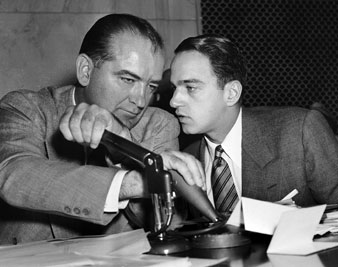Election 2024: Climate Action vs. Radical Deregulation
Voters should consider the radical, right-wing deregulation agenda that would await on Day One of a second Trump administration.

The Iowa Caucuses are 12 days away. The South Carolina Republican Primary comes 5 weeks later. And just two weeks after that is Super Tuesday. In the lead up to all these primary contests, anti-democracy candidate Donald Trump continues to march toward capturing the GOP nomination with a commanding lead in national polls. While headlines largely focus on Trump’s rhetoric, his dangerous deregulation agenda should get the spotlight.
Radical right-wing policy strategists already have an elaborate battle plan for a second Trump administration and it includes a scorched-earth approach to dismantling environmental protections and climate policies. We know because they’ve outlined their policy plans in a 920-page agenda called “Mandate for Leadership: The Conservative Promise.” This agenda was facilitated by the Heritage Foundation—the conservative think tank that also has a dark money-fueled activist wing called Heritage Action—under the name Project 2025: Presidential Transition Project. (The think tank has published this game plan ahead of presidential transitions since the 1980’s.)
This latest document is dripping with disdain for federal bureaucracies, especially environmental regulators. “Congress passes intentionally vague laws that delegate decision-making over a given issue to a federal agency,” the document reads. “That agency’s bureaucrats—not just unelected but seemingly unfireable—then leap at the chance to fill the vacuum created by Congress’s preening cowardice. The federal government is growing larger and less constitutionally accountable—even to the President—every year.”
When the authors start listing one-by-one the federal agencies that have become overly powerful, it is the EPA that shows up first. “A combination of elected and unelected bureaucrats at the Environmental Protection Agency quietly strangles domestic energy production through difficult-to-understand rulemaking processes.” The first Trump administration’s approach to climate change was to ignore it, by deleting mentions of it on the White House website and erasing EPA’s public-facing pages laying out climate science. A second Trump administration would do more than ignore climate science; it would work to undermine successful climate policies, as well as current and future environmental regulations, during a critical 4-year window. Welcome to the climate crisis election.
So, who exactly are the architects of this agenda? They describe themselves as “400 scholars and policy experts from across the conservative movement” including “former elected officials, world-renowned economists, and veterans from four presidential Administrations.” Those authors and contributors who have a background in energy issues are a ‘who’s who’ of oil and gas industry apologists.
Daren Bakst is Deputy Director, Center for Energy and Environment, and Senior Fellow at the Competitive Enterprise Institute. He’s described as “one of the most effective advocates for Free Market Environmentalism,” which he defines in opposition to “the religion of climate extremism.” Bakst hosts an unlistenable podcast called Powercast that spreads climate misinformation with the help of guests that include other of these “Project 2025” contributors.
Thomas Pyle is president of the Institute for Energy Research, which was formed by Charles Koch and has received donations from companies like Exxon to publish papers opposing climate science and any efforts to control greenhouse gasses. Before that, he worked as a registered lobbyist for Koch Industries and served as the Koch Industries Director of Federal Affairs from 2001 through 2005, according to the Intercept. He served in the Trump administration leading the transition team at the Department of Energy.
Diana Furchtgott-Roth directs the Center for Energy, Climate, and Environment at The Heritage Foundation and is adjunct professor of economics at George Washington University. She has served in several Republican administrations but most recently in the Trump administration at the U.S. Department of Transportation where she advised Secretary Elaine Chao.
Thomas F. Gilman is director of ACLJ Action, a Christian advocacy organization run by Trump lawyer Jordan Sekulow. Gillman worked in the auto industry for decades, including at Chrysler. He served as Assistant Secretary of Commerce for Administration and Chief Financial Officer of the U.S. Department of Commerce in the Trump administration.
Mandy M. Gunasekara is a Visiting Fellow in the Center for Energy, Climate, and Environment at The Heritage Foundation. She served as Chief of Staff to EPA Administrator Andrew Wheeler in the Trump administration. She calls herself “the chief-architect” of the Paris Agreement withdrawal while at the EPA, where she “set a record for cutting red tape while minimizing unnecessary interference from the federal bureaucracy.”
Bernard L. McNamee is an energy and regulatory attorney at the McGuireWoods law firm who has represented natural gas and electric utilities. He has served as a policy advisor for right-wing Republicans including Sen. Ted Cruz. He served on the Federal Energy Regulatory Commission, nominated by Trump. During that time, he was a key vote to green light 14 Liquified Natural Gas export facilities in a little over a year and ending a two year period in which no LNG export facility had been approved.
One missing name: Andrew Wheeler, the coal mining lobbyist who became EPA Administrator under Trump. It’s somewhat curious because Wheeler joined the Heritage Foundation in 2021, although more recently Wheeler was nominated (and struggling) to serve as Virginia’s secretary of natural resources.
I’ll be writing about their various deregulation ambitions in the coming weeks and months. For now, suffice it to say that the energy and environmental policy of a second Trump term would largely be crafted by these people. Judging by their records between 2016-2020, but also before and after, these policy thinkers are deeply out of step of what American voters want from the federal government. A recent Yale survey found that 78% of registered voters support generating renewable energy on public land in the U.S and 64% think developing sources of clean energy should be a high or very high priority for the president and Congress. Asked if the U.S. president should declare global warming a national emergency if Congress does not take further action, 58% of registered voters said they support such an emergency declaration. This survey also found that when the Biden administration’s energy policies were described to them, 71% of them supported those policies.
Journalists, environmental advocates, and voters should be vigorously discussing these anti-environment policies now. The stakes in the 2024 election are impossibly high—for American democracy, but also the world’s response to the climate crisis. Media outlets have learned (and forgotten, and then re-learned) many lessons about covering Trump over the last decade. One of those lessons is to focus attention on what he does more than what he says. This 920-page policy agenda may not have been put out by the Trump campaign itself, but it’s intended for a Trump administration. A simple search of the Heritage Foundation’s “Mandate for Leadership” comes up with just 2 mentions of Florida Gov. Ron DeSantis and a single mention of former U.N. Ambassador Nikki Haley. The document mentions Trump 312 times. Heritage’s policy proposals in 2016 were used, at least at first, by the first Trump administration as a transition game plan. (The foundation bragged that 64% of their policy proposals in 2016 ended up in the first Trump budget.)
By all accounts, the first Trump administration was ill prepared and made off-the-cuff decisions, including jettisoning much of its transition team and throwing out the game plan, in favor of Twitter edicts. The authors of this 2025 battle plan are betting that a second Trump administration would be far more disciplined to accomplish far more than they could the first time around. Voters should expect that too. As George W. Bush once said: “Fool me once… shame on you. Fool me — you can’t get fooled again.”
Reader Comments
One Reply to “Election 2024: Climate Action vs. Radical Deregulation”
Comments are closed.






It’s self-interested hedonism vs adult responsibility. The reactionary party has descended to thinking like self-righteous teen agers who feel entitled to do whatever they want regardless of consequences to others. Unfortunately, progressives have failed to convey an acceptable counter message that appeals to people’s social conscious. Hypocritical elites who act in a manner inconsiderate of others’ plight don’t help.